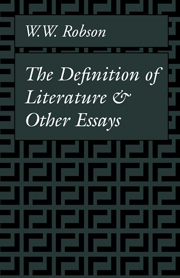Book contents
- Frontmatter
- Contents
- Preface
- Bibliographical note
- 1 The Definition of Literature
- 2 On Liberty of Interpreting
- 3 Evaluative Criticism, and Criticism without Evaluation
- 4 The Novel: a Critical Impasse?
- 5 The Sea Cook: a Study in the Art of Robert Louis Stevenson
- 6 On Kidnapped
- 7 On The Wind in the Willows
- 8 The Present Value of Tennyson
- 9 Robert Frost
- 10 Hopkins and Literary Criticism
- 11 T. S. Eliot: a Poet's Notebook
- 12 I. A. Richards
- 13 Yvor Winters: Counter-romantic
11 - T. S. Eliot: a Poet's Notebook
Published online by Cambridge University Press: 01 June 2011
- Frontmatter
- Contents
- Preface
- Bibliographical note
- 1 The Definition of Literature
- 2 On Liberty of Interpreting
- 3 Evaluative Criticism, and Criticism without Evaluation
- 4 The Novel: a Critical Impasse?
- 5 The Sea Cook: a Study in the Art of Robert Louis Stevenson
- 6 On Kidnapped
- 7 On The Wind in the Willows
- 8 The Present Value of Tennyson
- 9 Robert Frost
- 10 Hopkins and Literary Criticism
- 11 T. S. Eliot: a Poet's Notebook
- 12 I. A. Richards
- 13 Yvor Winters: Counter-romantic
Summary
In one respect T. S. Eliot is unusual among critics of eminence: he left on record (in ‘To Criticize the Critic’, 1961) an extensive and severe commentary on his own criticism. Opinions about this depend on one's view of Eliot. Those who dislike him will see it as a characteristically slippery action, a cunning bid to steal his opponents' thunder. Those who admire him will feel gratitude for his candour, and may reflect on how greatly we should have valued such an apologia – and mea culpa – on the part of Samuel Johnson or Matthew Arnold. Whatever view we take, Eliot's remarks on the scope, limitations, and shortcomings of what he wrote on other authors are so penetrating that there seems little for anyone else to add or subtract. Of course a man is not usually a good judge in his own cause; but in this case the task of judgment has been performed so well that one might think inquiry into Eliot's prose writings should now be left to those whose chief interest is in his accomplishment in the ‘other harmony’, or in material relevant to the study of his poems and plays. Or perhaps it should be left to those interested in appraising – nowadays often in a hostile spirit – his religious, social, or political point of view; or searching, with the F. R. Leavis of recent years, for evidence of impure motives and unworthy moral and emotional attitudes.
- Type
- Chapter
- Information
- The Definition of Literature and Other Essays , pp. 216 - 236Publisher: Cambridge University PressPrint publication year: 1982



